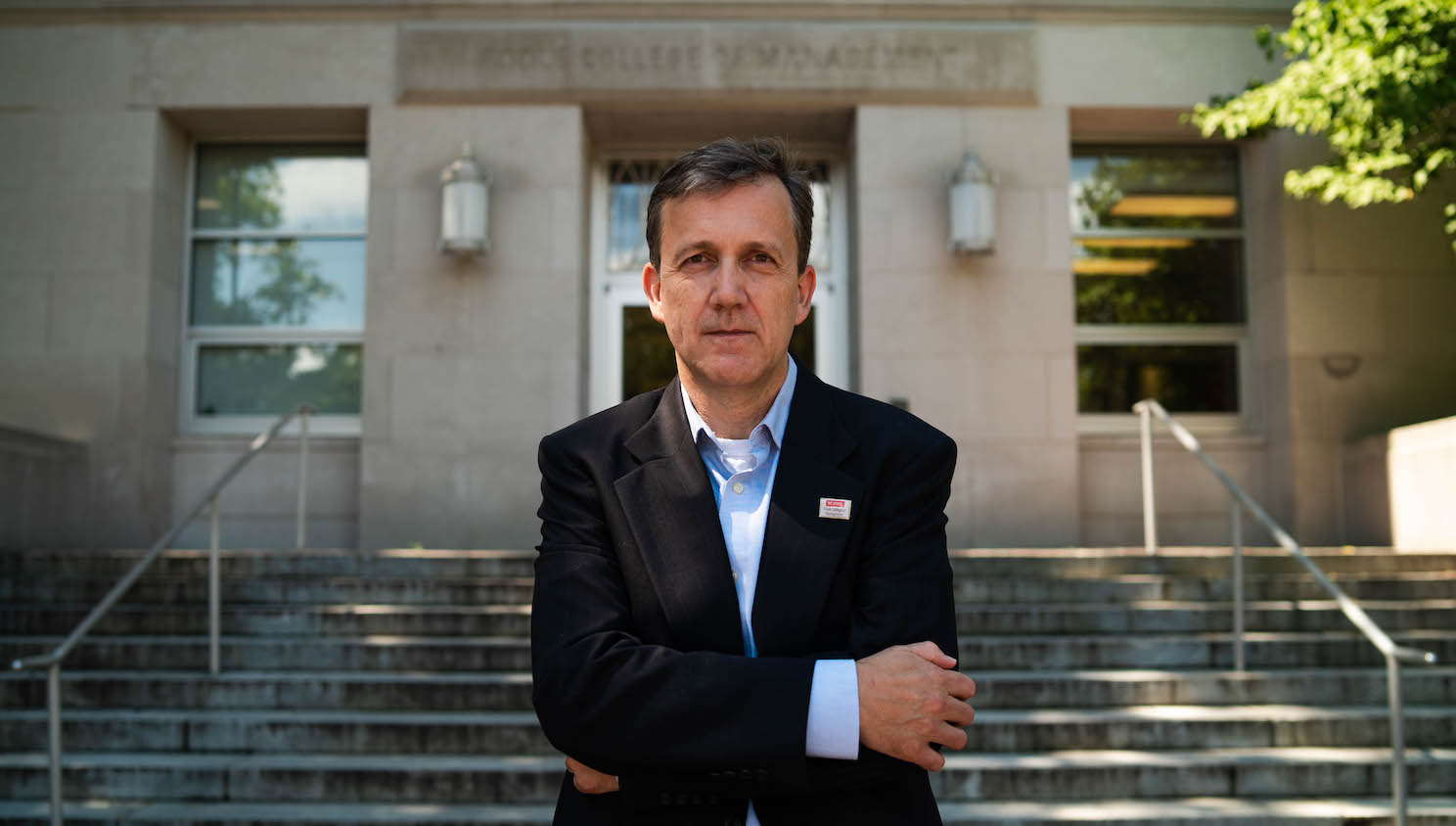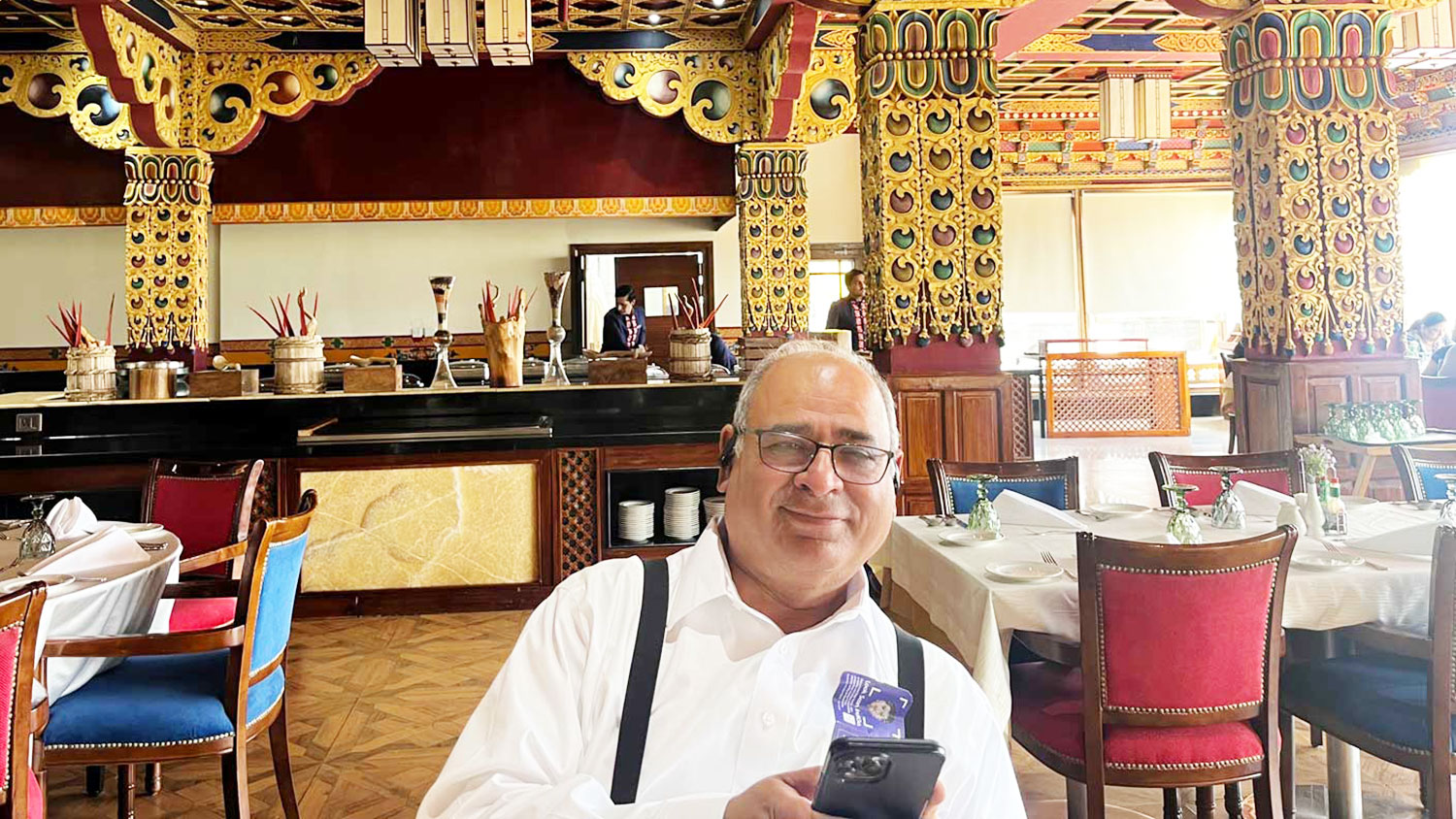Introducing Poole Thought Leadership: A Conversation With Richard Warr
We sat down with Richard Warr, associate dean for faculty and research, to talk about what Poole Thought Leadership offers, the scope of research at Poole College and why the work we do matters to people far beyond campus.

By Alastair Hadden
July 2020 marked the launch of Poole Thought Leadership, a new resource we’ve created for current and aspiring business professionals. As a Research I and land-grant university, NC State has a duty to put applied research in people’s hands — and use what we know for the good of all. This new hub for thought leadership offers a wealth of short, actionable insights stemming from our teaching and research — including business fundamentals, recent trends and insights, and the perspectives of faculty at the forefront of their fields.
Poole Magazine: What was the thinking behind Poole Thought Leadership? What inspired this direction?
Richard Warr: We wanted to change the way we communicate our knowledge and our understanding of the business world to the greater community. The traditional way is to publish a paper, but those research publications are not necessarily timely. Meanwhile, we have faculty who have detailed knowledge about what is going on in the world now. They’re ready to apply their expertise, their teaching and research, their general understanding. We wanted to have a vehicle through which they could share that knowledge and provide resources for the outside world — helping people understand, in layman’s terms, the things that are going on in the economy, the business world and more broadly.
As a business school at a land-grant university, we feel we have an obligation to provide real-time help to our business leaders and communities, just in the same way that the College of Agriculture and Life Sciences helps farmers with their crops.
When the COVID-19 outbreak began, we created the Poole Business Guide in response and rolled it out very quickly. We were able to produce these snippets of information, short videos and articles on focused topics: When are the stimulus checks coming? What are the implications for small businesses or entrepreneurs? Why is the stock market behaving strangely? The success of that guide reinforced our decision that this was the way to go. We’ve found that our faculty are willing and able to communicate in a much more grounded way.
As a business school at a land-grant university, we feel we have an obligation to provide real-time help to our business leaders and communities, just in the same way that the College of Agriculture and Life Sciences helps farmers with their crops. So we offer classroom education, academic research and now this third channel of more general thought leadership.
PM: What sets Poole Thought Leadership apart from other business school websites or news stories?
RW: Typically, college websites are static. They’re places where you go to find something out and then move on. We wanted to provide a place where people would go and stay because the information was engaging and relevant. They’d say “that’s interesting” and click another link to find more stories and insights.
That experience ultimately helps people become more aware of what we’re doing at Poole College. We want people to think maybe they should get a master’s degree here, or maybe contact us to find out about executive education opportunities. We view it as a marketing tool — a way to show our expertise, demonstrate the ways we can help you succeed or solve problems … and here’s our contact information if you want to have a more in-depth conversation.
PM: What does Poole Thought Leadership offer? How does it serve different audiences, including business professionals?
RW: On issues like the recent stimulus checks or tax law changes, it can be hard for business professionals to find unbiased, practical information. Finding a good source is difficult because so many people have a political or commercial stake in it. But we don’t have that stake. We’re giving you the advice that we think is reasonable, and we’re willing to put it out there as a service to the public. These are insights, suggestions, recommendations, opinions without an agenda. We want people to make the right business decisions. We want our advice to be useful. If it is, then maybe come back to us and we can work on something together.
Finding a good source is difficult because so many people have a political or commercial stake in it. But we don’t have that stake. We’re giving you the advice that we think is reasonable, and we’re willing to put it out there as a service to the public.
Even if they don’t come back, if our insights help an entrepreneur start a business that’s successful and that leads to people being hired in North Carolina, then that’s a great outcome. Another benefit is people becoming aware of the good work we do here and how strong our graduates are. Particularly as a younger business school, it’s important to remind people of what we can offer them — and remind business leaders who may be hiring of the quality of our graduates going out into the workforce.
PM: What do you see as the role of research and thought leadership at a business school, especially a business school situated within a Research I university like NC State?
RW: The research we do, generally, is fundamental: trying to understand how markets, the economy and business operate. Much of that, admittedly, does not have direct implication for business decisions — just in the same way that, in the sciences, studying the structure of the cell may not have immediate benefits for the biopharma industry.
But a lot of this research does have more practical implications. An example I’d give is we have a faculty member, Jesse Ellis, who researches the performance of hedge funds. He and his colleagues documented a few years ago that the performance metrics are flawed because they suffer from survivorship bias; the ones that failed and went bankrupt aren’t counted, so hedge fund performance is often overstated. That has direct implications on investment decisions that large institutions make. Another example is we’ve got folks who do a lot of work on school assignment: How do you design a system for assigning kids to schools? And that work is very theoretical, but their basic model and insights are being used by many school districts.
As a part of NC State, we fully recognize that our role is not only to do our stuff, but also to work with and enhance the research of our STEM and humanities colleagues across campus. We do a lot of interdisciplinary research with those folks and try to help them where we can.
Our job is to advance knowledge. That’s the role of any academic. But at a land-grant, Research I business school, we also take that knowledge and ask how we can apply it to big business problems. And because our faculty are so ingrained and understand the problems in so much depth, they’re able to teach our students better and provide much more nuanced external advice, whether it’s through consulting or executive education or thought leadership. Another way of putting it is you have to be a total expert in something to provide simple advice. That’s what Poole Thought Leadership is about.
The last thing I’d say is this: Whereas a lot of business schools think of themselves as existing independently of their universities, we’re not like that. As a part of NC State, we fully recognize that our role is not only to do our stuff, but also to work with and enhance the research of our STEM and humanities colleagues across campus. We do a lot of interdisciplinary research with those folks and try to help them where we can.
PM: Can you speak to the scope and breadth of research at Poole College — from fundamental insights to our sponsored research with partners to the work being done in our centers and initiatives?
RW: I mentioned that school choice topic; we’re one of the world leaders in that. We’re also one of the leaders in retirement research. And we have a lot of people working in the realm of audits — rather than just looking at the numbers, what other signals can you find that might indicate something is going on within an organization? We also have a lot of people doing research in leadership and how to structure teams to be more effective. There’s a science to that: These are ways you make a team, particularly a global team, more efficient.
Our work is far-reaching. In supply chain, we have grants to look at labor practices: slave labor, sweatshop labor and other abusive practices. How can companies identify these, and how can we work to prevent them? We’ve just created a Business Analytics and AI Initiative that uses analytical tools to solve business problems. We’ve signed a grant and are working with the Clinton Health Access Initiative to track the treatment and progress of COVID-19 in African countries. Then there’s our consumer behavior work. Stacy Wood is doing a lot of research with UNC hospitals around end-of-life conversations. Doctors often just muddle through it, but there are insights from consumer behavior that can help make those conversations with patients less painful for everybody.
And there’s straight-up business research, of course: economics, marketing, accounting, finance, sustainability. I’ve researched how firms’ diversity policies impact their rate of innovation, for example. For us, it’s a lot less the conventional business school question of how businesses make money. We look at a lot of other questions, and many of them have impactful societal benefits. The idea is to try to make the world a better place.
PM: What excites you about the work being done at Poole College — and about Poole Thought Leadership?
RW: One thing I like about this Thought Leadership platform is that it makes it easier — even as the associate dean for faculty and research — to keep up with all the cool stuff we’re doing at Poole College. And this is really cool stuff.
We’re not a traditional business school. We give our faculty a lot of flexibility to ask and answer questions that they think are interesting and important, and that’s why our research is so varied and creative.
We’re not a traditional business school. We’re not stuck with rigid ideas of what we should be doing or investigating. We give our faculty a lot of flexibility to ask and answer questions that they think are interesting and important, and that’s why our research is so varied and creative. We know that a lot of it is impactful, that it has the potential to make a difference in the world. Poole Thought Leadership is about getting it out there, sharing those ideas and generating a conversation.
Be the First to Know
- Categories:


